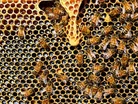Honey imported into the US found to be adulterated

The US Food and Drug Administration (FDA) has released data from a sampling assignment carried out in 2021 and 2022 to test imported honey for economically motivated adulteration (EMA).
EMA occurs, for example, when someone intentionally leaves out, takes out, or substitutes a valuable ingredient or part of a food or when a substance is added to a food to make it appear better or of greater value.
The sampling was designed to identify products that contained less expensive undeclared added sweeteners, such as syrups from cane and corn. The agency collected and tested 144 samples of imported honey from bulk and retail shipments from 32 countries. The FDA found 14 samples (10%) to be violative. The agency refused entry of violative shipments into the US and placed the associated company and product on an import alert.
A spokesman for the FDA said in a statement: "The FDA routinely assesses imported honey products to ensure accurate product labelling and otherwise help keep consumers from being deceived.
"The agency will continue to test honey for EMA under the agency’s import sampling and risk-based import entry screening programme.
"Violative samples are subject to agency action, such as recall and import refusal, consistent with the agency’s mission to ensure that food is safe, wholesome and properly labelled. When appropriate, the agency may consider pursuing criminal investigations.
"The FDA also collaborates with international counterparts to detect and combat EMA related to imported products, including honey."



